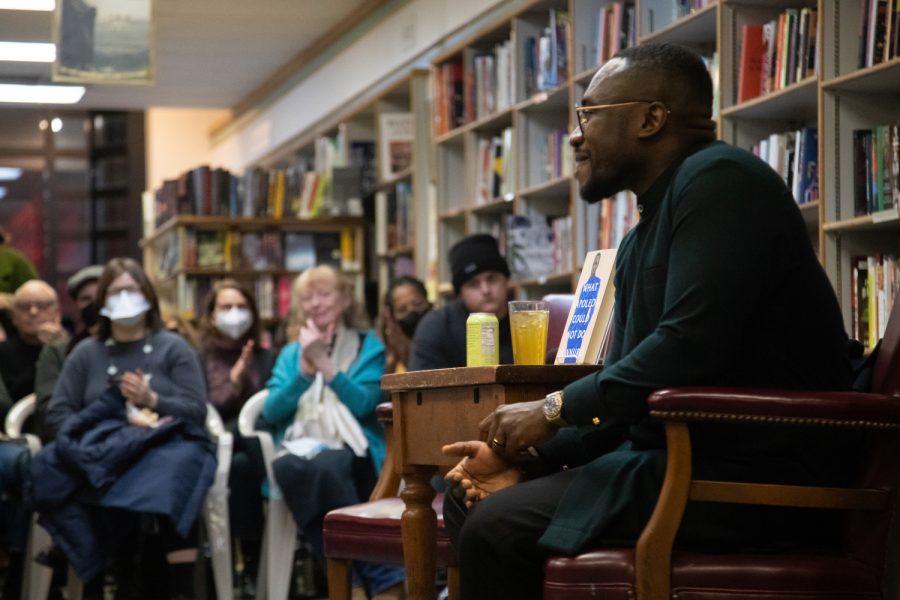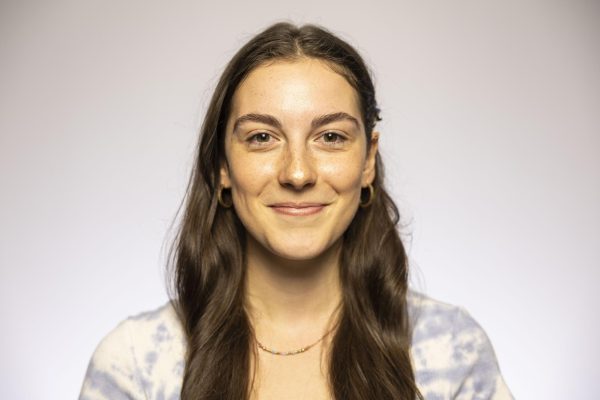Ask the Author | DK Nnuro
Author and adjunct Assistant Professor at the UI DK Nnuro read an excerpt from his first novel, “What Napoleon Could Not Do” at Prairie Lights on Feb. 8. As curator of Special Projects at the Stanley Museum of Art, Nnuro’s work and writing largely focus on African American identity and the strength of family.
Author DK Nnuro seen at a live reading at Prairie Lights in Iowa City on Wednesday Feb. 8, 2023.
February 14, 2023
Derek Nnuro, or DK Nnuro, is a Ghanaian writer and graduate of Johns Hopkins University and the Iowa Writers’ Workshop. He is the curator of special projects at the Stanley Museum of Art and an adjunct assistant professor at the College of Liberal Arts and Sciences. On Feb. 7, he published his first novel, “What Napoleon Could Not Do.”
The Daily Iowan: According to Stanley Reads, objects in the homecoming exhibition are connected to themes in your book. Could you explain those connections?
DK Nnuro: For a long time, we have been known as the premier academic institution for African art. I started here as the associate writer, and now my role is as curator of special projects. But the primary reason why I really wanted to work here was that this is an institution that has been at the forefront of African art in the U.S. The first Ph.D. in African art was given here at the University of Iowa. So, the University of Iowa writ large, but the Stanley Museum more specifically, has really been at the forefront of African art. And as a result of that, we have a lot of holdings in African art and a lot of works from Ghana. I identify as Ashanti and, in fact, we have a lot of kente in our collection. Kente is a woven fabric. Now, I have all kinds of connections to kente. Not only is there a character in my novel who wears kente to a wedding, but my father is actually from Bonwire, which is where kente originated. So, kente’s in my blood. And our collection has some fabulous kente pieces, and we have some up now. We have one kente piece up now. So, specifically, that’s one example of works in our collection that directly connects to my novel.
DI: In the process of writing and publishing your first novel, is there anything that you have discovered about yourself as a writer or about your artistic process?
Nnuro: I don’t know if I can really divorce who I am from my being a writer. Despite me writing under a pen name, I still don’t know if I can divorce who I am from my being a writer. I say this because of the answer I’m going to give you. What I’ve learned hasn’t necessarily informed my artistic output, but it has actually confronted me with, in fact, who I really am. It turns out that I’m quite the control freak. Once the novel leaves your hands, once the publisher buys it, you really are giving up control. You are giving up marketing control. You are giving up publicity control. Of course, it’s going to be informed. All of marketing and all of publicity are going to be informed by the work, and it’s going to be informed about how you talk about the work. There is an element of when things come out and how they come out, and I think I am used to that control because of my administrative role here at the University of Iowa. Because I’m the curator of special projects, I’m at the helm of a lot of projects, and that includes all kinds of control.
During the writing process, everything was under my control. The characters died when I wanted them to die. The characters laughed when I wanted them to laugh. So, interestingly, I have been the master of my own destiny for a very long time, particularly because I spent four years on this novel really solely focused on it.
RELATED: Ask the Author | Tegan Nia Swanson
DI: Did you conduct research for this book? If so, what was your research process like?
Nnuro: This is not merely an autobiographical novel. I am not a classic debut novelist whose debut novel is highly autobiographical. This is not nearly that, not even close. It is to some degree informed by other people’s lives. A lot of the craft is informed by other novels that I love, like “Atonement.” So, a lot of the novel was informed by what I have experienced, not in terms of how I’ve been shaped as a person, but what I’ve seen from other people.
There has been ongoing research since — I don’t know — time immemorial for me. I have always, whether advertently or inadvertently, been researching this novel. But there is a character in my novel who is named Wilder Thomas. He is a 66-year-old Vietnam War veteran. He is a Black man from Texas. His character I did a great deal of research for. In fact, his namesake, the Reverend Lee Wilder Thomas, is a real person. He was a Black oil baron who made his wealth in Mexia in the 1920s. After he made all this wealth in Mexia, Texas, he relocated to Oklahoma to make more money. The research was so eye-opening.
In recent years, thankfully, we’ve heard more about Black Wall Street, which was in Oklahoma, and the potential for what would have been a lot of Black wealth. Because of the attack on Black Wall Street, that potential was destroyed. People like the Reverend Lee Wilder Thomas and other Black people who started to make their wealth in Oklahoma despite the destruction of that world showed that there was still a great deal of Black resilience. There was still a great deal of Black resilience in Wilder Thomas for me, despite his ancestry and not necessarily having any Oklahoma but specifically having a Mexia tie because he was born and raised in Mexico. Like the Reverend Lee Wilder Thomas, is for me an emblem of Black resilience in this country. He has, for all intents and purposes, at least economically, his family has thrived despite the interventions of white supremacy that said, “We are not going to allow you to thrive.” His family was resilient, and they were able to sustain and grow their Black wealth. So, yeah, he’s definitely a character that was informed by my research into Black resilience with regard to maintaining wealth.
DI: If you could meet one of your characters in real life, who would it be and what would you say to them?
Nnuro: I think I’ve met some semblance of each of them in real life. So, I’m trying to think of one character. Well, there is a character named Postwoman in the novel. She is of Ghanaian descent. She’s a Ghanaian woman. She’s a very strong woman. To not give you any spoilers, I’ll just say she’s a very, very, very strong woman. But part of her strength comes from her long walk with heartbreak. So, I think if I met Postwoman, I’d give her the biggest hug ever. I really do. I think I would give Postwoman the biggest hug ever. Because she’s so strong and I’m just like, man, you know, it’s good to be strong. She needs to be strong. But sometimes, maybe all Postwoman needs is a big ol’ hug.















